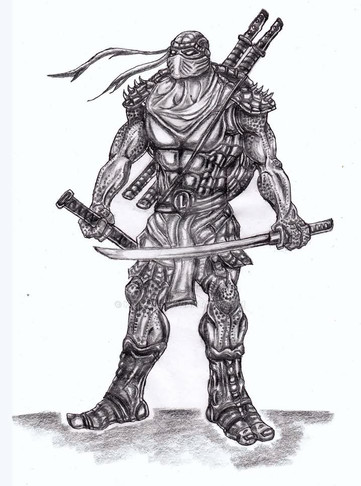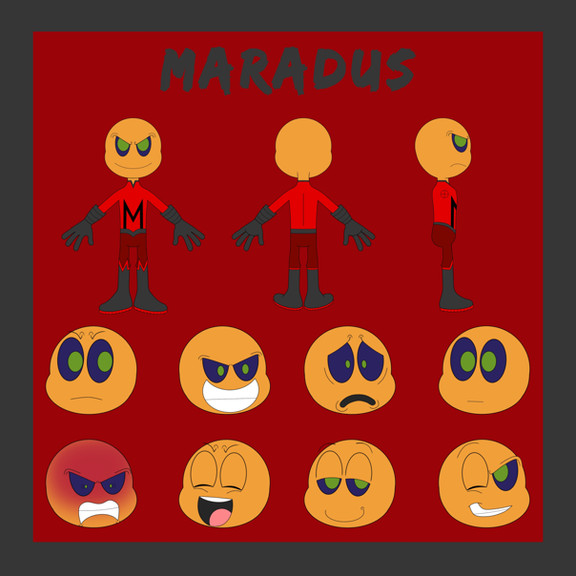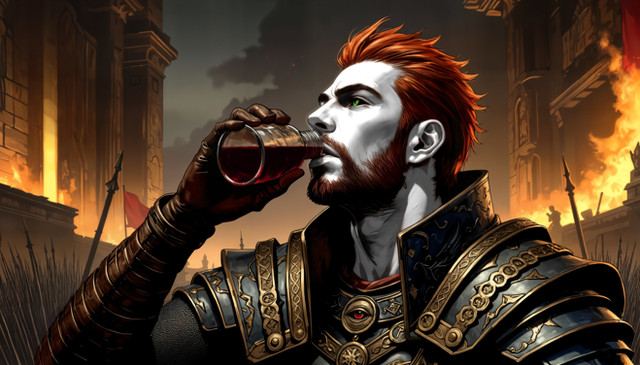HOME | DD
 Avapithecus — Hassan-i Sabbah
Avapithecus — Hassan-i Sabbah

#assassin #character #crusades #design #history #islam #muslim #referencesheet #shia #nizari #ismaili #hassanisabbah
Published: 2023-09-05 16:19:59 +0000 UTC; Views: 6022; Favourites: 58; Downloads: 0
Redirect to original
Description
There's very little information out there about the founder of the historical Assassins that hasn't been obscured by legend and propaganda. Oftentimes, these legends get confused with the future head of the Assassins based in Masyaf, Rashid ad-Din Sinan, so it can be difficult to parse out an exact biography. I've seen it stated that fragments of Hassan's autobiography only survived in fragments from a medieval Iranian text called Sargozasht-e Seyyednā, but that this text too is only known through quotations. I couldn't even find the exact manuscripts these texts are found in, let alone an English translation, so we're already off to a pretty lousy start when it comes to primary sources. Who'd have thunk it would be so difficult to find information about a man who created an entire organization of history's perfect stealth operatives?We know that Hassan-i Sabbah was born in the Iranian city of Qom sometime in the mid-11th century CE. His father was of Yemeni stock, and a devout follower of the Twelver branch of Shia Islam. At the age of 17, however, while Hassan-i Sabbah was being educated in the city of Rey, he came into contact with a prominent da'i, basically a missionary charged with quietly gathering allies deep in the heart of the very Sunni Seljuk Empire. Hassan was persuaded to convert to the Isma'ili cause, and swore allegiance to the Shia imam/Fatimid caliph, al-Mustansir Billah. I already did a summary of the differences between all these branches in my blurb on the Assassins themselves, so for brevity's sake I won't rehash what was already an extremely oversimplified explanation of Islamic denominations. For now, just know that Hassan had a new pep in his step, and sought to pledge his faith in Egypt where he'd be more welcome. He arrived in Cairo in 1078, and got his new life off to an absolutely swimming start by pissing off one of the most powerful men in the Caliphate, the grand vizier, who exiled him back to Iran in 1081. In 1094, the vizier's son and successor, Al-Afdal Shahanshah, would proceed to usurp al-Mustansir's heir, Nizar, in favor of the weaker puppet caliph al-Musta'li. I'm gonna go out on a limb and say that this event, combined with the whole awkward "exile" thing, is probably why Hassan became a staunch Nizari dedicated to protecting the imamate of Nizar's heirs. I guess if you're the kind of guy who openly pisses off the grand vizier, you're also not the kind of guy who'll back down from a succession crisis. But how was Hassan to protect the interests of the Shia people from within the heart of the Seljuk Empire, a place notoriously unfriendly to Shias of any variety? He was just a humble da'i, not a military commander. He only knew the art of shadows and whispers… and so that's exactly what he put all his skill points into.
In 1188, Hassan had found his way to a fortress nestled deep within the mountain wilderness of northern Iran. Named "Alamut" (meaning "eagle's nest", based on the legend that the founding king witnessed the good omen of an eagle perched on the mountain), this imposing castle would be impregnable to any invading army. One charismatic missionary, however, would have no trouble slipping inside like just another stranger and start doing what he did best: make friends. Over the next two years, Hassan kicked his da'i training into overdrive, mingling among the people, learning of their woes, and making allies in the highest positions of power. By the time the governor of the castle learned that something was up, it was already too late. The entire city was on Hassan's side by 1090, and they had no love for the governor anymore. The governor was forced to get the hell out of dodge lest he find his head served up on a platter, thus surrendering the fortress to Hassan without a single drop of blood being spilt. Hassan was a goddamn badass, what a power move. Alamut thus became a safe haven for Hassan's followers, who were taught in the same ways of stealth and espionage. When Alamut was inevitably threatened again by the now very pissed off Seljuks, they turned this stealth into the perfect weapon which can equalize even the mightiest king and fiercest general: assassination. Indeed, it is from Hassan's organization that we get our modern word "assassin", though the term itself is of uncertain etymology, more on that in the blurb on Assassins proper.
Medieval legend claims that Hassan never again left his study in Alamut, deciding to devote his life to organizing the Assassins in castles across the Middle East and studying philosophy, until he died in 1124. How true this is, we'll probably never know, but to fill in this 30 year gap, I'll take the time to discuss some of the high profile men targeted by the Assassins during this period. The first is also one of the most unimpressive. Hey, cut 'em some slack, they're still figuring out this whole "assassin" thing. The Seljuk vizier, Nizam al-Mulk, had beef with Hassan ever since the whole taking over Alamut without killing anyone thing. I know, what a fucking asshole that Hassan guy is, right? What kind of monster kicks a man out of his castle peacefully? That poor governor probably got sentenced to a stern talking to from his boss! Absolutely barbaric. Nizam's continued agitation against these Assassins, shock of shocks, led to him getting ambushed and stabbed in the heart on the road to Baghdad in 1092, making him one of the first historical victims of the Assassins, and setting the precedent that the Assassins were not bound to the traditional rules of warfare. This actually earned them a quite favorable reputation amongst the common man wherever they set up shop. Afterall, armies pillage, murder, destroy property, conscript civilians, and all those other horrible things armies are known to do. The Assassins, meanwhile, singled out one corrupt nobleman sitting on a fat pile of gold and took them out individually at nothing more than the risk of their own lives. To your average medieval peasant, there was never anything to fear from an Assassin's blade.
In 1097, the Seljuk emir of Aleppo, Fakhr al-Mulk Ridwan, found himself in a bit of a pickle. See, he really enjoyed this hobby of having a head on his shoulders, and he was a little concerned that the Fatimids on his doorstep were going to interrupt this passtime. So when vizier Al-Afdal approached him saying they'd be all cool and that the Fatimids would even give his state a major stat boost, Ridwan accepted, and converted to Musta'lism… for four weeks, because evidently his hobby wasn't all that important to him. By this point, Ridwan had been approached by Al-Hakim al-Munajjim, an Assassin da'i sent by Hassan to appeal to Aleppo's large Shia population. Ridwan used the cash bonus he got from Al-Afdal to sponsor an Assassin bureau within the city. As I'm sure you can tell by now, pissing off the Fatimid vizier was Hassan-i Sabbah's favorite hobby. This turn of events incidentally also pissed off Ridwan's own vizier, Janah ad-Dawla, who raised an army to rebel against the emir. Janah ad-Dawla locked himself inside of the city of Homs, but such trifling mortal defenses such as "walls" were no obstacle to the Assassins. Al-Hakim al-Munajjim had the Janah ad-Dawla assassinated within his own fortress in 1103, giving the Assassins the territorial foothold they would eventually need to establish their famous base of operations in nearby Masyaf castle.
The other giant pickle bobbing in Ridwan's jar of brine was that a bunch of Christian nutjobs had been storming into the Holy Land since 1096 on the pretense of "Crusade", whatever that meant. A certain Mawdud, military commander of the city of Mosul, knew exactly what it meant, and rallied his army against two of the most egregious of the Crusader kings: Baldwin II and Tancred, to reclaim the Holy Land from these foreign invaders. Ridwan, however, had other plans. He didn't particularly give a rat's ass about losing the holy city of Jerusalem to the Christians, and had even worked with Tancred on occasion. Really, the biggest thorn in his side was this self-righteous asshole Mawdud. I mean come on, who does he think he is? I'll tell you who he is, he's dead that's what. He was stabbed by an Assassin while regrouping his forces in Damascus in 1113. That'll show him! Eh? What do you mean the populace is pissed off at us now? Yeah this… this was really a big miscalculation for the Assassins' PR. They'd just killed the head of the unified rebellion against the Crusaders on behalf of a petty emir who was starting to develop a reputation for being a selfish slimy backstabber, or "politician" as it is often shortened to. The Assassins were promptly expelled from both Aleppo and Damascus as a result. If you wanna get real ironic in hindsight, their assassination allowed Baldwin to keep Jerusalem under his command. Baldwin, in 1120, would in turn set up a headquarters for a ragtag group of knights calling themselves the "Poor Fellow Soldiers of Christ", or, as they now had a base of operations in the Temple Mount, the "Templars". That's a big oof right there. Great idea for a fanfiction though.
On the other side of the Muslim world, the Seljuks were still trying to buff out this annoying Assassin pest that kept setting up shop in various mountain strongholds. The Seljuk sultan, Ahmad Sanjar, attempted to retake Alamut itself in 1118. You'd think this would've been a big enough event to coax Hassan out of his study for once, but no, that's not how Hassan operates. Instead, Ahmad Sanjar awoke one morning, completely secure in his well-guarded, completely locked down tent, only to find a dagger embedded just inches from where he was sleeping. Pinned by the dagger was a polite note handwritten by Hassan-i Sabbah himself, simply stating that he would like peace. This understandably scared the living shit out of Ahmad Sanjar, who retreated his forces and offered tribute to the Old Man of the Mountain. This freed Hassan up to finally do what he had clearly been building up to for the past three decades: assassinate vizier Al-Afdal Shahanshah. Maybe… Al-Afdal Shahanshah was assassinated in 1121 (in fact he had survived two different assassination attempts at this point) but who exactly wielded the knife is a bit of a mystery. Contemporary accounts blame Al-Musta'li's successor, Caliph Al-Amir, but the writer in me can't help but grow attached to the theory that the Assassins finally tagged the bitch to avenge their long lost imam Nizar. We'll probably never know for sure. Hassan himself fell ill and died in 1124, taking all of his secrets with him to the grave, save for one last mysterious quote: "Nothing is true. Everything is permitted."
…Maybe. While this is certainly the most famous quote from any Nizari in history, it's actually extremely difficult to trace its provenance that far back. Ubisoft got this inspiration for the titular Assassin's Creed directly from the 1938 novel Alamut by Slovene author Vladimir Bartol, who spun the tale of the Assassins into a metaphor for the acts of indoctrinated terrorism rampant throughout interwar Italy and Yugoslavia. Bartol, in turn, got the quote from Frederich Nietzsche, who assigned the quote to Hassan's dying words in his 1887 Genealogy of Morality, but actually first used it generally in his 1883 Thus Spoke Zarathustra. Nietzsche takes this quote to exemplify that the Assassins were among the early representatives of his idea of what a society of nihilist anarchists would look like. This is obviously how Assassin's Creed has taken it, but it becomes a little strange when you place this mental image next to the historical Assassins, a sect of devout Muslims who stood for the hereditary rights of a divinely appointed caliph-imam. In fact, we can actually blame this interpretation and the assignment of the quote on French orientalist Antoine Isaac Silvestre de Sacy, who wrote a treatise on the Assassins in 1809. De Sacy relied heavily on the legends of Marco Polo, rather than contemporary Islamic documents. He's the one who popularized the idea that the Assassins became such proficient killers, and derived their very name from, the practice of smoking hashish to see visions of the Paradise they'd be rewarded with for obeying their Old Man of the Mountain. This myth is easily debunked, as our oldest source for the word "Assassin" is the late 12th century scribe William of Tyre, who outright states that no one in his time seems to know where the word comes from. It certainly wasn't "Hashashin", then, and honestly this interpretation just gets more laughable when you consider that if they were getting so high on hashish that their heads poked into heaven itself, there ain't a force on this planet that's gonna get those potatoes to move an inch, let alone carry out CIA-level assassination missions. Or, in the words of my incredibly enlightened father: "no one's robbing a bank when they're high. When you get high, all you wanna do is sit on the floor and eat Doritos. I don't get why that's illegal." Of course, moral panics over illicit substances aren't exactly a modern phenomenon, and these Europeans needed an excuse to wonder how on earth could anyone want to kill them? What could these good Christian men possibly have done to earn anyone's ire? No no, surely they must be blazed out of their skulls and doing the bidding of an evil godless master who knew everything was just a lie and they could do whatever they want. If there is any semblance of truth to Hassan's dying words, it seems much more likely that it would've fallen more in line with how it's treated in the games: not an act of permission to do whatever you want, but a warning that all actions have consequences, not just for you, but for everyone you leave in the wake of history. All men will die eventually. What priorities would you be willing to die for?
Design notes, the internet only has a select handful of depictions of Hassan himself to offer. The two most famous are a headshot and an illustration of him riding a horse. As far as I can tell, these are both 19th century engravings, but sadly it seems they've been recirculated around the internet so damn much that no one has any clue of the provenance beyond that. If anyone out there knows the real origins behind these pieces, please do let me know. One image I was able to source was a woodcut by French artist Pierre Méjanel, who drew the illustration for a 1886 book titled "Les Mystères de la Franc-Maçonnerie devoilés". I'll let you decide how that's pronounced. Apparently this was an anti-masonic book which alleged that the Assassins (Marco Polo's version of the drugged up suicidal Assassins that is) were somehow forerunners to the Freemasons. Not gonna lie, I kinda wish I could read French, because that sounds like an awesome story to read. Then I'd have to read French though. None of these depictions are particularly detailed or make Hassan stand out from any other typical 11th century Middle Easterner, though they certainly try to aim for more "menacing cult leader" than Nizari philosopher. I decided to amend this, softening his expression and dressing him up in regal robes based on my previous Nizari designs. I'm actually quite pleased with how this came out in the end. I was a little worried at first, but the colors really brought the lineart together, which is always satisfying.
Related content
Comments: 2

👍: 2 ⏩: 1

👍: 1 ⏩: 0

























